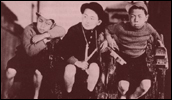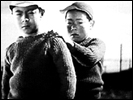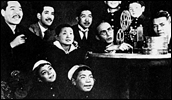I Was Born, But…
- Year
- 1932
- Original title
- Umarete wa Mitakeredo
- Japanese title
- 生まれてはみたけれど
- Director
- Cast
- Running time
- 91 minutes
- Published
- 16 July 2002



by Jasper Sharp
Yasujiro Ozu has been described by more than one writer as having the ability to take simple soap opera scenarios and elevate them to the realms of High Art. Working entirely within the gendai-geki genre of films that dealt with contemporary subjects, he made these whimsically low-key depictions of family life with such an intricate attention to nuance and detail that any apparent absences of tangible plot are barely noticeable. One always comes from an Ozu film feeling as if you've witnessed some fundamental truth about humanity, and this early silent film proves the point perfectly. Not only did it win the director the first of his six Kinema Junpo Best Film of the Year awards, but it also paved the way for a style which would be developed and refined until his death on 12 December 1963, the day of his 60th birthday.
The Yoshii family have just moved to their new family home in the suburbs of Tokyo, conveniently situated in the environs of the house of Mr Iwasaki (Sakamoto), the owner of the company where the father Kennosuke (Saito) works as a humble desk clerk. Straight away the two sons Keiji and Ryoichi (Kozo and Sugawara), aged eight and ten respectively, are slugging it out with the gang of local brats, but the pecking order is established fairly early on in the day and, with the help of a local delivery boy, Ryoichi has soon emerged as top dog.
Amongst the neighbour kids is Taro (Kato), the son of their father's boss, permanently dressed in a pristine black shorts suit and the object of some degree of envy from the Yoshii boys. Not long after an argument about who has the most important father, the entire Yoshii family are invited to a social evening at the Iwasaki household where the two new kids on the block are humiliated in front of their smug classmate as they witness their father kow-towing to his superior and playing the buffoon in a series of home movies shot by the boss.
Later, the devastated Ryoichi and Keiji berate their father for his obsequious antics in front of his employer and their own loss of face with Taro. Father explains that as Iwasaki owns the company where he works, he is obliged to treat him with respect. The boys ask whether Taro will own his own company when he grows up, and if so, will they have to bow and scrape to him too, pointing out that not only are they both receiving higher grades at school but they are also tougher in the playground. With the angry father explaining that this is the way of the world before retreating to his saké, the boys leave in disgust and go on hunger strike. However, it is not long before they both give into their empty stomachs as mother Eiko (Yoshikawa) calls them to the dinner table. The next day, the children depart for school. Father departs for work. Life goes on.
Scripted by Akira Fushimi, a highly regarded scriptwriter of the day who wrote a number of successful screenplays for, amongst other directors, Heinosuke Gosho (the 1933 film adaptation of Yasunari Kawabata's The Izu Dancer / Izu no Odoriko), and Ozu (I Flunked, But... / Rakudai wa Shita Keredo, 1930), I Was Born, But... was shot at Shochiku's Kamata studios before the company relocated their production facilities to Ofuna in 1936. Its approach and subject matter are typical of the type of films the company, who only entered the market in 1920, were trying to promote under the guiding hand of producer Shiro Kido: life-affirming and optimistic whilst broaching at least a few social issues. According to Donald Richie, Kido later described his goal as "to look at the reality of human nature through the everyday activities of society", nurturing such talents as Ozu to fulfil this dream. At any rate, the Kido approach rapidly led the company to become one of the most successful of the Japanese major studios.
As much as any of Ozu's films, I Was Born, But... takes the intimate internal dynamics of the family unit as his point of reference to draw out broader generalisations about society as a whole, presenting us with a detailed yet non-judgemental snapshot of the customs and concerns of the time. Father is seen departing to work alongside his children, the youngsters balancing their packed lunches on their heads as mother Eiko sees them all off at the doorstep. Later on Ozu indulges us with a long pan of the father sitting at a row of desks populated by white-collared salarymen, immediate followed by a similar shot of the children's rowdy classroom as they scrape away at their slates. There the similarities between the two lifestyles seem to end, as the kids are later seen bunking off school, coughing and spluttering on a cigarette, and kicking sand in each other's faces, though such antics do not go on unnoticed for long, and they are soon back behind their desks.
Though the director later stated that it was with I Was Born, But... that he decided to consciously eschew all usage of fade ins and fade outs, setting in motion the continuing simplification process of his film grammar that reached its apogee with the trademark minimalism of director's better known work of the 1950s, all the staples we come to recognise in the director's later work are here: The put-upon salaryman stoically hiding behind his newspaper whilst mother acts as a silent yet sympathetic intermediary as her children play up to him (a very similar scene exists in the director's much later Good Morning / Ohayo, 1961), with the trademark low angle camera shots capturing these private scenes of domesticity. However, there's a slightly more slapstick element in this early film, as can be seen early on as Iwasaki helps out when the Yoshii's car gets stuck in the mud outside the new dream house they are moving into, further underlining father Yoshii's ignominious status in his relationship with his boss.
More than anything I Was Born, But... is an elegy to the lost innocence of youth, depicting, as it does, the first stages of the process of erosion in which the youthful subjects' naïve idealism comes head to head with the harsh, unjust realities of the adult world. It is made all the more poignant by the fact that it portrays a generation whose lives would soon be shattered by the Pacific War in which they would be fighting. Worth mentioning is that child actor, Tokkan Kozo, playing the balloon-faced younger son (the one on the left hand side of the film's most frequently seen publicity still) would later change his professional name to Tomio Aoki, and go on to a long acting career - one of his last roles being the exuberantly amorous octogenarian who made Makoto Shinozaki's Not Forgotten so unforgettable. Viewing these two films that bracket the hopes and achievements of an entire generation side-by-side suggests that despite the rugged path that destiny maps out for us and the hardships that fate throws in our path, a return to a state of such carefree innocence is well within our grasp.
Ozu stuck with the silent format up until 1936, the last major director in Japan to do so. Many of these early films have been subsequently lost, though this particular one has fortunately survived as a testament to the director's emerging style thanks to the efforts of Shinsui Matsuda, whose benshi accompaniment lends the air of an early American docu-drama, and is entirely necessary to follow the story. Indeed, the heavy use of intertitles, especially in the final heated exchanges between father and sons means that viewing this in a non-subbed version may prove fairly fruitless. The version in the Matsuda archives suffers from some fairly noticeable print damage in the final reels, though given the low survival rate of films from this period, we should be grateful that it exists in any state. However, given the immense efforts that has obviously been put into its preservation and restoration, I'm rather surprised that the same care hasn't been lavished on the video presentation of the Japanese release, with heads frequently lost to the top of the frame. A more widely available revisit on DVD is long overdue, not only for the legendary status of its guiding hand, but as a heart-warming document of a society that has changed beyond all recognition in its surface details, yet in terms of the individuals that comprise it, remains as timeless as ever.